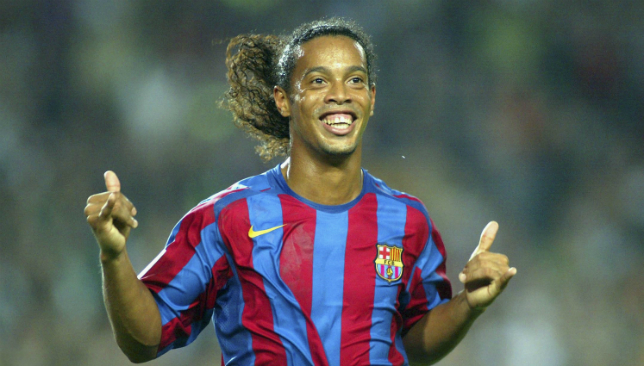
It was also the game’s deadliest.
If you were the opposition, that smile meant bad news. Ronaldinho had scored an incredible goal, or elastico-ed a defender of yours onto the ground. Ronaldinho had scooped the ball over one of your team-mates, then flicked it back over his head, and then again.
He played with a smile because he embodied a simple philosophy. Express yourself. Do what you love. Enjoy doing it. He also smiled because he knew, with all his tricks and flicks, he wasn’t just beating you. He was embarrassing you, and he was loving it.
Ronaldinho also loved to dance. Juke one way, jerk another, twist his hips, then his feet. Watch his famous goal against Chelsea, the way he contorts his body, and you can just about imagine the figure of someone at a nightclub, trying out a new move. No? Too far-fetched? Well, then, just see some of his goal celebrations.
This was Ronaldinho. Smiling, giggling, dancing. Childlike innocence meets spirit of samba.
Lionel Messi and Cristiano Ronaldo will likely go down as the best footballers ever. Or Diego Maradona and Pele. Or Ronaldo (not Cristiano) and Zinedine Zidane.
There’s no “Ronaldinho and…”. There’s no one to compare him with. At his best, he had no rival. He was, for that short time, better than any footballer we’ve seen.
He was a rising star as his compatriot Ronaldo hit his peak, forming the “Three Rs” with Rivaldo to lead Brazil to glory at the 2002 World Cup – where he provided his first global display of jaw-dropping brilliance, the free-kick against England that left goalkeeper David Seaman stunned.
After that, the stage was Ronaldinho’s.
He moved from PSG to Barcelona in 2003, after Real Madrid chose to sign David Beckham instead of Ronaldinho because the Englishman was supposedly more marketable.
Ronaldinho at Barcelona was a marketer’s dream. Arriving in a team that had finished sixth the previous season, Ronaldinho rejuvenated the club. His first goal: dribbling from the halfway line, beating two Sevilla players, then crashing a thunderous shot in off the crossbar, leaving his manager, Frank Rijkaard, with hands on head in disbelief.
He finished that campaign winning his first FIFA World Player of the Year award. The next season, in 2004-05, he’d go one better, winning it again while also collecting the Ballon d’Or, and leading Barcelona to their first league title in six years. 12 months later and they were champions of Europe, Ronaldinho finishing as the Champions League‘s second-highest goalscorer and joint-top assist provider for the season.
Along the way, Ronaldinho reminded Real Madrid exactly what they’d passed up. In 2005, Barcelona travelled to Madrid, to take on Ronaldo, Zidane, and, of course, Beckham. They humiliated Madrid. By the end, the Santiago Bernabeu was on its feet, giving an ovation to their bitterest rival’s best player while their own team suffered a 3-0 loss.
Not marketable enough?
As if proving a point, a couple months earlier, Nike made Ronaldinho the first YouTube star. All it took was handing him a pair of white-and-gold boots and a football.
Ronaldinho laces up, grabs the ball, and sets off. What followed was a jaw-dropping display of skill. Keepy-ups while walking to the top of the box. Then a crossbar challenge. On the volley. He hit the bar four times, pausing to do more keepy-ups and balancing the ball on his head. Until Ronaldinho decided he wanted to dribble, from the moment he started juggling, through the walking and the crossbar challenge and the balancing, the ball never touched the ground.
Beckham couldn’t have done that.
At a time when no one really knew what YouTube was, Nike and Ronaldinho’s video became the first to hit one million views.
That ad, that Bernabeu ovation, the Champions League trophy, was the beginning of the end. The 2006 World Cup saw Ronaldinho’s first big disappointment, as a tournament he was supposed to dominate got away from him. Real Madrid wrestled back the La Liga title the following May. A year later, having passed the baton to Messi, Ronaldinho and Barcelona parted ways.
He was never the same again.
AC Milan caught glimpses of his best, enough to be forever revered by Milan fans. When he returned to Brazil, there were still a few sparks of genius. Flamengo saw his epic duel with Neymar, when Ronaldinho brought his side back from 3-0 down at Neymar’s Santos for a 5-4 win. At Atletico Mineiro he fulfilled a lifelong dream, winning the Copa Libertadores. South America’s Champions League equivalent – and arguably harder to win – had been the trophy Ronaldinho dreamed of holding as a child.
He played football in Mexico, futsal in India. All the while, grinning, dancing, always making it look like having a ball at your feet was the best way to live.
We can wonder at the “what ifs”. If he’d partied less in Paris and Barcelona. If he’d trained harder. If he’d stayed at Barcelona when Pep Guardiola arrived. If he’d used the disappointment of the 2006 World Cup as fuel for 2010 (he didn’t even make Brazil’s squad). Would we be talking about him as the greatest ever?
But we were talking about him as the greatest ever, if only for a brief while. In that period, what Ronaldinho did changed football. That wizardry on the ball. Those magical, dancing feet. That joyful samba spirit. That smile.
Joga Bonito. The beautiful game. That was Nike Football’s tagline, and they found a glorious way to showcase it. Ronaldinho as a child, floating past defenders, scoring outrageous goals, all with that famous grin. Ronaldinho as an adult, doing exactly the same.
Because he never did grow up. That’s why we loved him. He was always the child in love with football. Playing with wide-eyed, frenzied glee. As if the only thing worth doing is playing football.
And it’s only worth doing if you do it with a big, deadly smile.